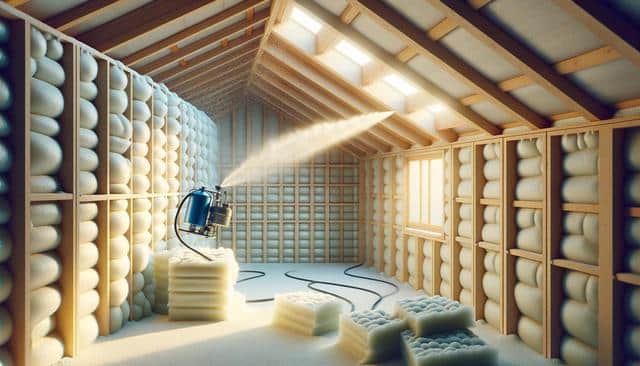Understanding the Benefits of Spray Foam Insulation for Homes and Buildings
Spray foam insulation has gained popularity as an efficient solution for improving energy performance in residential and commercial properties.

What is Spray Foam Insulation?
Spray foam insulation is a type of insulation that is applied using a spray gun, expanding into a foam that seals gaps and cracks. This insulation is composed of two main chemical components that react when mixed, forming a rigid or semi-rigid material. It is commonly used in walls, ceilings, floors, and other hard-to-reach areas due to its expansive properties. Spray foam is available in two forms: open-cell and closed-cell, each offering unique characteristics in terms of density, thermal resistance, and moisture control.
Open-cell spray foam is lighter and more flexible, offering soundproofing benefits while allowing some vapor permeability. Closed-cell foam, on the other hand, is denser and provides a higher R-value per inch, making it suitable for areas where space is limited but high insulation performance is required. Choosing the right type depends on the specific insulation needs and the environmental conditions of the structure.
Energy Efficiency and Cost Savings
One of the most notable advantages of spray foam insulation is its ability to significantly improve energy efficiency. By creating an airtight seal, spray foam reduces the amount of air that escapes or enters a building, which minimizes the need for heating and cooling systems to work overtime. As a result, property owners often see a noticeable reduction in their energy bills over time.
Additional energy-saving benefits include:
- Improved HVAC system performance due to reduced air leakage
- Consistent indoor temperatures throughout the year
- Lower carbon footprint as a result of energy conservation
Though the initial installation cost of spray foam insulation is higher than other traditional materials, the long-term savings in energy costs and potential tax incentives related to energy-efficient upgrades can offset the upfront investment.
Air Sealing and Moisture Control
Spray foam insulation serves a dual purpose by not only insulating but also sealing against air infiltration. This feature is particularly beneficial in older buildings where small gaps and cracks are common. The foam expands to fill even the smallest openings, helping to keep conditioned air inside and unconditioned air out.
Moisture control is another critical advantage. Closed-cell spray foam acts as a barrier against water vapor, reducing the risk of mold and mildew growth. This makes it an appealing choice for basements, crawl spaces, and areas with high humidity. Proper moisture management leads to a healthier indoor environment and helps preserve the structural integrity of the building.
Soundproofing and Indoor Comfort
In addition to its thermal properties, spray foam insulation contributes to soundproofing. The open-cell variant is especially effective in absorbing sound, making it ideal for interior walls, home theaters, or multi-unit buildings where noise reduction is important. By dampening airborne sounds, spray foam helps create a quieter and more comfortable living or working space.
Other comfort-related advantages include:
- Fewer drafts and cold spots
- Improved indoor air quality due to reduced pollutant entry
- Enhanced overall comfort through temperature and humidity control
These benefits make spray foam a valuable choice for anyone seeking to improve both the functionality and comfort of their property.
Environmental Considerations and Longevity
Spray foam insulation is also known for its durability. Once applied and cured, it remains effective for many years without significant degradation. This long lifespan reduces the need for frequent replacements, thereby minimizing waste. Furthermore, its high efficiency can contribute to green building certifications and environmental goals.
While some formulations of spray foam contain chemicals that may raise environmental concerns, newer products are being developed with more eco-friendly blowing agents and reduced emissions. It’s important to consult with professionals who use products that align with current environmental standards and safety regulations.
When installed correctly, spray foam insulation can offer decades of reliable performance, making it a long-term investment in energy savings, comfort, and sustainability.
Conclusion: Is Spray Foam Insulation Right for You?
Spray foam insulation is a versatile and effective solution for improving energy efficiency, indoor comfort, and moisture control. Whether you’re building a new home or upgrading an older property, this type of insulation offers long-lasting performance and can contribute to lower utility costs and a healthier indoor environment. While the initial cost may be higher than other insulation types, the long-term benefits often justify the investment for many homeowners and property managers. If you’re considering insulation options, spray foam is certainly worth exploring with a qualified professional to determine if it aligns with your building needs and energy goals.